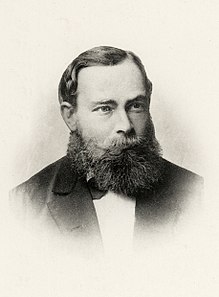Gottlob Frege
| Gottlob Frege | |
|---|---|

Frege in c. 1879
|
|
| Born | 8 November 1848 Wismar, Mecklenburg-Schwerin, Germany |
| Died | 26 July 1925 (aged 76) Bad Kleinen, Mecklenburg-Schwerin, Germany |
| Alma mater |
University of Jena University of Göttingen (PhD) |
| Notable work |
Begriffsschrift (1879) The Foundations of Arithmetic (1884) |
| Era |
19th-century philosophy 20th-century philosophy |
| Region | Western philosophy |
| School |
Analytic philosophy Logical objectivism Logicism Transcendental idealism (before 1891) Realism (after 1891) |
|
Main interests
|
Philosophy of mathematics, mathematical logic, philosophy of language |
|
Notable ideas
|
Principle of compositionality, quantification theory, predicate calculus, logicism, sense and reference, concept and object, Third Realm, mediated reference theory, descriptivist theory of names, redundancy theory of truth,Hume's principle, Frege's theorem, Frege–Geach problem, law of trichotomy, technique for binding arguments |
|
Influenced
|
|
Friedrich Ludwig Gottlob Frege (/ˈfreɪɡə/;German: [ˈɡɔtloːp ˈfreːɡə]; 8 November 1848 – 26 July 1925) was a German philosopher, logician, and mathematician.
Considered a major figure in mathematics, he is responsible for the development of modern logic and making contributions to the foundations of mathematics. He is also understood by many to be the father of analytic philosophy, where he concentrated on the philosophy of language and mathematics. Though largely ignored during his lifetime, Giuseppe Peano (1858–1932) and Bertrand Russell (1872–1970) introduced his work to later generations of logicians and philosophers.
Frege was born in 1848 in Wismar, Mecklenburg-Schwerin (today part of Mecklenburg-Vorpommern). His father Carl (Karl) Alexander Frege (1809–1866) was the co-founder and headmaster of a girls' high school until his death. After Carl's death, the school was led by Frege's mother Auguste Wilhelmine Sophie Frege (née Bialloblotzky, 12 January 1815 – 14 October 1898); her mother was Auguste Amalia Maria Ballhorn, a descendant of Philipp Melanchthon and her father was Johann Heinrich Siegfried Bialloblotzky, a descendant of a Polish noble family who left Poland in the 17th century.
In childhood, Frege encountered philosophies that would guide his future scientific career. For example, his father wrote a textbook on the German language for children aged 9–13, entitled Hülfsbuch zum Unterrichte in der deutschen Sprache für Kinder von 9 bis 13 Jahren (2nd ed., Wismar 1850; 3rd ed., Wismar and Ludwigslust: Hinstorff, 1862), the first section of which dealt with the structure and logic of language.
...
Wikipedia
